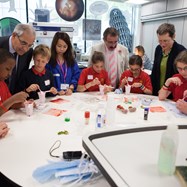Widening access through community engagement
University of Bristol’s BA in English Literature and Community Engagement (ELCE) is a key feature of the university’s widening participation programme. The programme is taught one night per week (6pm to 9pm) plus occasional Saturdays, which means it is more accessible to those who need to study around other commitments such as working or caring for family.
Students on the programme come from a varied range of backgrounds, ranging in age from early 20s to mid-70s, and most live locally. Many do not have conventional prior qualifications and some have been out of education for up to 50 years. The programme recruits a high number of students from widening participation backgrounds. 64% of those admitted in 2016 were first in their family to attend higher education.
The first cohort of the degree programme, which launched in 2008, graduated in 2014, with 76% of students completing a qualification. 18% of the students who completed in that year achieved a first-class degree, an equivalent proportion of the cohort as on the full-time BA English at Bristol in the same year, a programme which has a AAA offer to A-Level applicants.
On the ELCE programme students can study a full chronological range of literature in English, from the Medieval to the twenty-first century and the programme is fully embedded in the English department, with the same staff, exam boards and administrative structures.
The community engagement of the programme is unique. Each student undertakes a community project, with up to 150 people per year taking part in a range of student-led reading groups and other activities. In 2011, a student called Damien Moran set up a reading group with Ideal Community Action, a charity in Barton Hill that works with individuals and communities affected by drug abuse, offending and long-term poverty. The group has run continuously since then, being handed down by different students, and has inspired a philosophy reading group and short courses in oral history, creative writing, and enterprise skills co-designed by the university and Ideal. Over 30 participants in the reading group have come on to study at the University, including on the six-month Reading English Literature course, which acts as a good preparation for the ELCE degree.
 X
X

